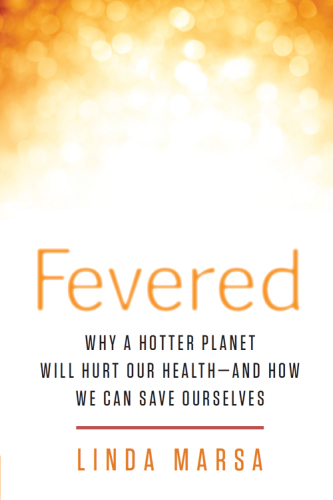
Fevered
Why a Hotter Planet Will Hurt Our Health — and how we can save ourselves
- اطلاعات
- نقد و بررسی
- دیدگاه کاربران
نقد و بررسی

May 13, 2013
Thus far, most nations don’t appear to have hit the threshold of alarm about climate change needed to convince policymakers to offer more than platitudes and empty promises. In her latest book, investigative journalist Marsa (Prescription for Profits: How the Pharmaceutical Industry Bankrolled the Unholy Marriage Between Science and Business), a contributing editor at Discover, drives home the personal implications of global warming, hoping to inspire change by showing how global warming affects health, resulting in rising rates of asthma, allergies, heart and lung disease, and cancer. Marsa focuses on the primary dangers connected to warming: the poleward creep of tropical disease ranges, declining air quality, heat stroke, increased frequency of extreme weather, and the risk of agricultural collapse. The author draws from real-world examples, including the Dust Bowl of the 1930s and more recent disasters such as Hurricane Katrina and Hurricane Sandy, to illustrate the hazardous world we are headed toward. All is not doom and gloom, however, as the author also supplies suggestions for mitigating actions that governments could take. Although at times Marsa seems to sail too close to the wind in her drive to inspire action, the rigor of the anthropogenic climate-change model seems unassailable to those in the reality-based community and the need for concrete action undeniable.

June 15, 2013
Discover contributing editor Marsa (Prescription for Profits: How the Pharmaceutical Industry Bankrolled the Unholy Alliance Between Science and Business, 1997) calls for "swift and decisive action" under American leadership to launch a worldwide "medical Marshall Plan." The author pulls together evidence to support her proposal to create a medical and public health infrastructure adequate to blunt the impact of global warming. She has consulted in-depth with experts in the areas of epidemiology, public health and disease control from the Centers for Disease Control, the British Medical Association publication The Lancet, and the Emerging Infectious Disease Program organized by Duke University and the National University of Singapore, among others. Marsa pays special attention to the re-emergence of diseases thought to have been eradicated or controlled within the U.S. and the emergence of new virus-borne diseases arising especially from Asia. The comeback of Dengue fever in the Brownsville/Matamoros area of Texas and the persistence of diseases like fungus-borne Arizona Valley Fever and the rodent-transmitted hantavirus also indicate regression. In Asia, supplies of clean drinking water, sewer and sanitation services, trash removal and electricity supplies are inadequate or not available, situations similar to that in many of the colonias in the border areas of Texas. The modern speed of worldwide transmission compounds the problem. Marsa also examines earlier models of New Deal civil engineering programs in the West and Southwest to control and supply water and power and the Dutch record in successfully organizing the construction of facilities to resist encroachment from the oceans. These complement her concern with the availability of medical and health infrastructures. Another well-written and persuasive wake-up call for serious action to be taken against the consequences of global warming.
COPYRIGHT(2013) Kirkus Reviews, ALL RIGHTS RESERVED.

July 1, 2013
As the world gets warmer, we'll live sicker and die quicker. Marsa nimbly navigates the topic of global warming and confirms the connection between climate change and disease. A hotter Earth triggers or worsens a variety of illnesses, including asthma, heat stroke, heart disease, and a multitude of infections. The World Health Organization (WHO) estimates that, worldwide over the past three decades, 150,000 people a year have died as a result of a warming planetmainly from increased mortality due to higher rates of malaria, diarrheal diseases, and floodsand that five million cases of illnesses can be attributed to it annually, too. A sweltering planet means a drier future, with grave implications for our food, water supply, and air quality. The year 2012 was the hottest in recorded history. Phenomena like derechos (severe widespread windstorms) and haboobs (wind-driven walls of dust) are no longer rare. Marsa forecasts a medical meltdown, for as Earth heats up, public health systems around the world will be overwhelmed. A megadose of preventive medicine for our planet is needed. Sobering, informative, and essential reading.(Reprinted with permission of Booklist, copyright 2013, American Library Association.)




دیدگاه کاربران